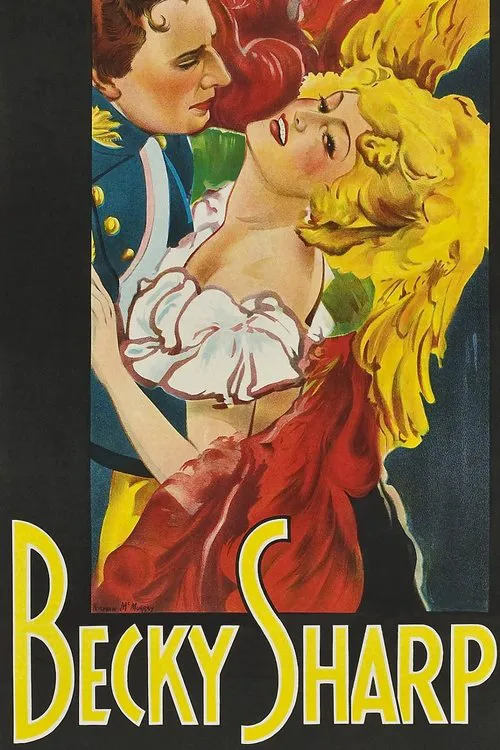Becky Sharp

Plot
Becky Sharp, a 1935 American historical drama film directed by Rouben Mamoulian, marks a significant milestone in cinema history by being the first feature-length film to utilize the groundbreaking three-strip Technicolor process. The movie's adaptation from William Makepeace Thackeray's novel "Vanity Fair" through a play, serves as an intriguing commentary on the intricacies of the English class system during the tumultuous era of the Napoleonic Wars. The film centers around the enchanting and ambitious Becky Sharp, portrayed by Miriam Hopkins, a cunning and opportunistic young woman who navigates the complexities of the upper class with a calculated precision. Born into poverty, Becky finds herself at the mercy of her strict and manipulative boarding-school educator, Miss Pinkerton. After being rejected by a noble family due to her humble background, Becky's future appears bleak, yet she remains undeterred. The narrative unfolds as Becky meets and befriends a young and impressionable Lady Rawdon, the daughter of a wealthy and well-connected British army officer. The bond between the two women is strong, but it serves as more than just a friendship; Becky has set her sights on a life of luxury and refinement, and she sees Lady Rawdon as the key to unlocking these aspirations. Becky cleverly manipulates the situation by becoming the governess to two of the Rawdon children, and her intelligence, wit, and beauty swiftly win over the family, particularly the father, Sir Pitt Rawdon. Throughout the film, Becky consistently demonstrates her remarkable adaptability, effortlessly switching between her 'inferior' background to blend in seamlessly with the aristocratic circles she aspires to inhabit. However, her true intentions are consistently shrouded in mystery, leaving the audience questioning her morality and motivations. As Becky's ascent through the ranks of the British upper class reaches a fever pitch, her relationships with those around her grow increasingly complex. Becky's association with General Rawdon and her growing romantic attachment to him serve as the catalyst for a series of events that will ultimately reshape the course of her life. While Sir Pitt Rawdon's wealth and influence present Becky with a life of indulgence, her desire for true connection and social standing grows more intense. However, her involvement in General Rawdon's life also creates tension between Becky and Lady Rawdon, as well as Sir Pitt Rawdon, who are oblivious to Becky's intentions. One of the most significant aspects of Becky Sharp is its nuanced portrayal of the intricacies of social hierarchy during the Napoleonic Wars. The British upper class was characterized by a rigid social structure, with strict lines separating the aristocracy from the lower classes. Becky Sharp not only critiques this rigid system but also illustrates the consequences of her own actions within it. Becky's ultimate downfall stems from her refusal to accept the consequences of her actions, coupled with her inability to recognize the social and economic constraints that govern her existence. In doing so, Becky becomes trapped by her own ambition, and the film culminates with her isolation and loneliness, the direct result of her relentless pursuit of the impossible. The 1935 version of Becky Sharp, directed by Rouben Mamoulian, marks a significant milestone in cinematic history with its pioneering use of the three-strip Technicolor process. While not receiving the reception it deserved upon its initial release, today, Becky Sharp is recognized as a groundbreaking film notable for its captivating portrayal of the complexities of the English class system during the Napoleonic Wars, its memorable performances, particularly Miriam Hopkins as Becky Sharp, and the influential film techniques and technological advancements that helped shape the course of motion pictures.
Reviews
Recommendations



